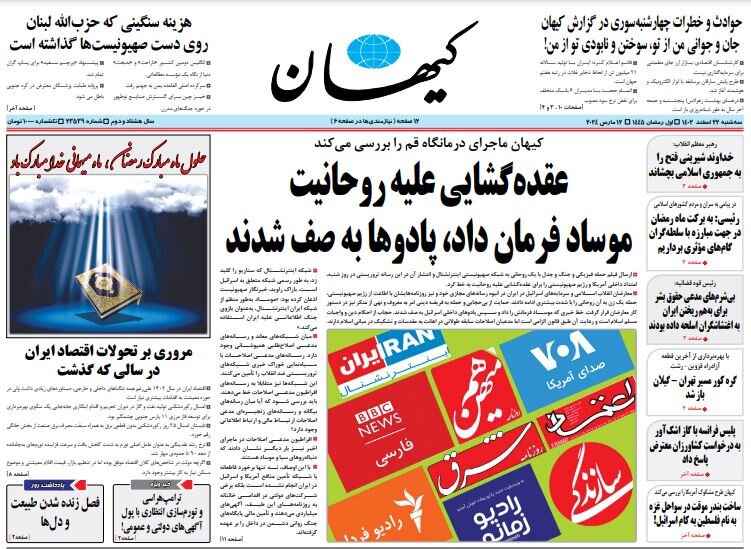Significant advantages of relations between Tehran and Riyadh

TEHRAN - In an article, Kayhan discussed the benefits of normalizing relations between Iran and Saudi Arabia and quoted the Chinese news agency Xinhua as saying: Tehran-Riyadh relations have overcome regional turmoil in the past year and have had significant benefits for the people of both countries and the region.
The historic reconciliation between Iran and Saudi Arabia is not only a manifestation of China's commitment to regional peace but also creates a new model for resolving conflicts through dialogue and negotiation. Facilitating the reconciliation of Iran and Saudi Arabia with the help of China has acted as a catalyst for the emergence of a new path of de-escalation among the countries of the Middle East, because shortly after, a series of positive developments in the Middle East peace process were achieved: Syria after a 12-year break returned to the Arab League, Qatar and Bahrain decided to restore diplomatic relations, relations between Iran, Turkey, and Egypt also improved and tensions in Yemen subsided. With their growing relations, the two countries are sending a clear message to the outside world that "lasting peace can only be achieved through reconciliation based on sincere dialogue."
Siasat-e-Rooz: The repeated story of a lie
Siasat-e-Rooz devoted its editorial to accusations against Iran leveled by the Western media. It wrote: The main issue of today's world and public opinion demands that human rights institutions and international courts deal with the issue of Palestine and the catastrophic genocide that the Zionist regime and its supporters have launched in Gaza. The silence of the Human Rights Council, and the failure to form a fact-finding committee regarding these crimes, has made the absurdity and politicization of the work of these institutions more obvious. This topic clearly shows the nature and origin of the biased report of the alleged committee against Iran, which is the same as supporting the Zionist regime and diverting public opinion to the margins instead of the Palestinian issue. Today, the Zionist regime, the murderer of 9,000 Palestinian women, is a member of the Women's Committee of the Human Rights Council, which reveals a bitter joke of the insolence and emptiness of these institutions. It is proof of the politicization and falsity of the claims and cases against Iran with the goal of promoting Iranophobia and fragmenting the unity of Iranians.
Javan: The Zionists could not prevent Iran from sending aid to the people of Gaza
In a commentary about Iran's humanitarian aid to Gaza, Javan wrote: Iran has always sent humanitarian aid to Gaza since the beginning of the Zionist regime's invasion of the Gaza Strip, despite all the problems and obstacles of the Tel Aviv regime. According to Kanaani, the spokesperson for Iran's diplomatic apparatus, due to the Israeli regime's blockade, it is not possible to send aid directly to the Palestinian territories. Unfortunately, Iran in numerous consultations with the Egyptian authorities, repeatedly heard from them that the Zionist regime does not allow the sending of this aid. But these issues did not stop Iran's efforts, and it has sent aid through Egypt, whenever it is possible to send aid, Iran will not hesitate to send aid. On the other hand, the United States has prevented the immediate stop of war in this region by vetoing the resolutions of the UN Security Council. In order to justify its belligerent policy, America is trying to correct its belligerent image with some ridiculous and showy actions by throwing aid from the sky for the people of Gaza, but fortunately, the world's opinion is aware of these showy actions.
Arman-e-Melli: Selling oil in the form of barter
In an analysis, Arman-e-Melli discussed the benefits of selling oil in the form of barter under sanctions. The paper said: Sanctions against Iran have caused Iran to turn to barter trade not only in the field of oil and energy but also in many other fields in order to be able to manage and fulfill what it needs in different fields. In fact, this approach is a process that some countries have invoked in the way of economic relations, and the main reason for this is the global movement in the direction of de-dollarization. Of course, due to the pressure of sanctions and the existing obstacles in the way of selling oil and gas, Iran has turned to barter trade. Some other countries supply their needs in this way. Iran has found its customers in this way and has been able to increase its supply to some extent.
